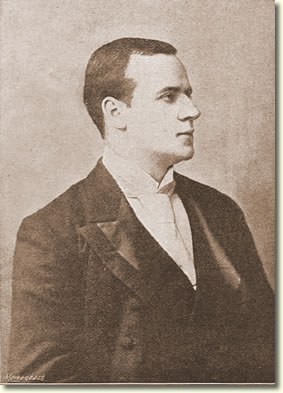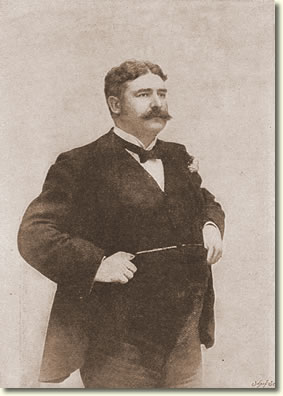 |
 |
||||||
MR A. PLAYFAIR, THE DANCING CORPORAL.
The first big laugh in “His Excellency” occurs when the gallant Danish Hussars, headed by Harold, their corporal, come hopping on the stage, and then keep up a kind of dancing step, while the corporal, who seems an embodiment of perpetual motion, sets out in song the grief of the hapless tee-to-tum warriors. The energy that Harold throws into the last stanza almost seems to suggest that he has too much of his comic business—
| Oh, you may laugh at our dancing-schoolery! | |
| It’s all very well, it amuses you; | |
| But how would you like this dashed tomfoolery | |
| Every day from ten to two? | |
Later on in the evening Harold and his men cause vast merriment by their ballet in which the Hussars, in full uniform, dance a complicated concerted piece, and Mr. Playfair, with no small technical skill and a fine fatuous air of grace, gives the light-toed manœuvres of an orthodox prima ballerina assoluta doing the coda of Italian ballet. It seemed to me that Mr. Playfair would be a good subject for an interview. On my way to his dressing-room I had an unexpected pleasure, for among the pretty girls trooping off the stage was Miss EllalineTerriss in her charming dress of apricot-blossom-coloured silk. Need I say how a few words of staircase gossip with the delightful, brilliant artist compensated me for braving the horrors of the wettest, dirtiest night in the record of London.
 |
| Arthur Playfair |
“The dance was taught to me very carefully by John D’Auban step by step, and I had to practise and rehearse a great deal. I can and do manage an imitation of most of the steps of the ladies whose costume seems to consist of a sunshade and a pair of braces, as one of the comic papers said. Entrechats? No, I can’t do an entrechat. I haven’t a chance of twiddling my legs, for we wear our spurs, and if I tried I should tear my leg, or trip and fall over the footlights, and—”
“Kill a fiddler, as the old tale puts it. But why wear spurs?”
“I don’t want to, but Mr. Gilbert says we’re cavalry, and cavalry wear spurs, so you see—”
“Yes, but we shouldn’t see. It’s funny what a fuss is often made behind the footlights about details quite invisible, or, at least, unnoticeable from the front. You must get awfully tired of your dancing—don’t you hate the encores?”
“Hate the encores? I should be wild if we didn’t get them; it’ a bit of a breather, but I quite enjoy the dance.”
“Not so much as the audience.”
“The people on the stage find it very funny; there used to be great laughter during the rehearsals. Yes, of course, Mr. Gilbert rehearsed us— what a wonderful stage-manager! One learns ever so much from being staged by him. Was I intended for the stage? No, for the army, not unnaturally. My father is Major-General A. L. Playfair, of the Indian Army, and my grandfather was Colonel Sir Hugh Lyon Playfair, so the family traditions were against the stage. I was born in India about twenty-five years ago, and went to school at St. Mary’s College, near Birmingham, and thence to the Oxford Military College; however, the glare of the footlights was too attractive.”
“Yes; but you are one of the moths whose wings remain unsinged. What was your first stage work?”
“In 1887 I began by a three weeks’ tour, without salary, in the Isle of Man, appearing in a small part in ‘Jim the Penman,’ as a member of Mr. Balsir Chatterton’s company.”
“You came up to London far quicker than most young actors. I remember you in ‘The Prancing, Girl’ at the Prince of Wales’s, doing it wonderful imitation of Beerbohm Tree. How do you study your imitations?”
“I don’t know. I went to see my subject in ‘Captain Swift’ two or three times, and—and there it was. Wyndham I learnt when I had a thinking part in ‘The School for Scandal.’ By-the-bye, Miss Ellaline Terriss, who has made such a hit in ‘His Excellency,’ was understudy in that production. I was one of the uneloquent guests. One of my most important engagements was Giorgio in ‘The Mountebanks,’ and I took Wyatt’s part for a week, and as I pleased Mr. Gilbert here I am. By-the-bye, he’s wonderfully kind in the way he takes trouble to praise people who do what he considers good work.”
 |
| George Edwardes |
“Gaiety? Oh, yes; I had a long turn there,” he replied. “In ‘Cinder-Ellen.’ I believe the public never tumbled to the trick that poor Fred Leslie and I used to play. We were dressed quite alike. It was announced that I would give imitations of him, and then he used to come forward and imitate himself with a fine, quaint touch of caricature. We were sufficiently like one another for the public to be deceived, and when the call came—it always did—I used to take it and get the credit. When there was a double call we came on together for it, and sometimes he’d give a wink that caused some, but not many, of the people to understand the game. Then, you know, I took Arthur Roberts’s part of Captain Coddington in ‘In Town.’ There was a lot of work that I did at the Trafalgar Square Theatre in ‘The Babble Shop,’ imitating Wyndham; in ‘Diplunacy,’ mimicking Forbes-Robertson; in ‘Tom, Dick. and Harry,’ when I was Harry.”
“You’ve forgotten ‘Mam’zelle Nitouche,’ in which you took off Mr. George Edwardes very cruelly. I remember, too, Sir Redan Tapeleigh in ‘Go Bang’; it’s a wonderful set of parts for so young an actor.”
“You’ve missed ‘Don Quixote,’ at the Strand. I’ve been very lucky, you know. Some people said I’d never be more than a mere mimic. However, I’ve—well, if I could please Mr. Gilbert as Harold—”
“And please the public and critics as well. You’ve clearly falsified the prophecy. Have you any turn for writing?”
“Not much, but I’ve finished a tale for the Pelican, and I’m going to try my hand at a burlesque. It can’t be worse than some that I’ve seen.”
Just at this moment the popular Frank Boyd, editor of the Pelican, came in, and after the usual manner of editors pitched into Mr. Playfair for being late with his “copy.” However, peace was restored when the manuscript was produced, and then the interview was merged in a triologue.
MONOCLE.
|
Page modified 16 October 2020